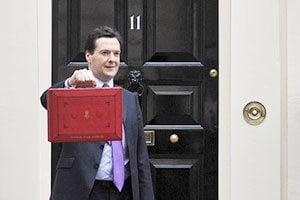

Economy
Budget 2015: what we want versus what we’ll get
As today’s review of previous budget statements shows, we’ve not been that impressed with the Chancellor’s annual statement on plans for government revenues and expenditures. The final budget of Mr Osborne’s before the general election will focus on giving the Conservatives some momentum in their deadlocked poll position with Labour.
Each year we’ve hoped that the Chancellor’s budget will put the United Kingdom on a long-term sustainable footing. Economic resilience is a vital foundation for sustainability, but so is society’s cohesion and the long-term viability of the environment, upon which we all depend.
Our deficit is still high, national debt is still rising rapidly and the UK has slipped down many global equality and social mobility indices, while being a poor advocate of serious action to address climate change and environmental degradation.
There are government solutions and market solutions to most problems. Naturally the Conservative party and liberal wing of the Liberal Democrats favour market solutions. We weren’t expecting to see massive subsidies or state intervention from tis government but we did get the Green Investment Bank, some support for railways, tax relief for social impact investment and spare change thrown at flood defences. But to counter that, enormous subsidies and incentives have been given to the oil and gas industry, while communities across Britain are sacrificed at the altar of fracking.
This year we’ll see inheritance tax, pension, savings and personal tax reform. The Chancellor will talk tough on tax avoidance and evasion while tycoons and corporations will still pay little or no tax. We are promised the welcome news that the Swansea Bay Tidal Lagoon project we first covered in 2013 is going to get government backing. A few more houses will be promised without addressing the underlying chronic shortage. We can expect some promotion of the Manchester/Leeds corridor, although we prefer the long stretch from Liverpool to Hull.
But again we will face another overtly political rather than economic or ecological budget. It will be full of low political tactics and thin on high statesmanlike strategy. This will be a budget written with the sole aim of winning an election in 50 days. It will not genuinely help the economic recovery, unite society, repair the United Kingdom or protect local and global environments.
The coalition had a unique opportunity to reshape our economy in 2010.
Energy efficiency, clean technology and renewables could have been front and centre for energy policy. Our still broken banking system could have been radically reformed, with major parts of the banking system in public hands. A massive social housing building project could have solved the housing crisis while creating a valuable national asset and boosting the economy. The lowest interest rates in recorded history could have meant locking in low repayments while investing in sustainable economic growth. We could have taken forward the work of the previous government to lead global work on addressing climate change.
The coalition wasted this opportunity.
Instead they tinkered with the feed-in-tariff, scapegoated the poorest in society (rather than the banks who caused the economic crash). They failed to encourage industry to build enough houses. They broke their promise on tuition fees, broke their promise on ‘no more top down reorganisation’ of the NHS, failed to reform our broken electoral system (which is going to cause electoral chaos in 2015) and failed to reform or replace our unelected House of Lords. They nearly broke the United Kingdom and have left the national press unfettered to distort the public debate and behave how they please.
They have increased the national debt more in five years than the last government did in thirteen, and left banking unreformed. They undervalued and then sold off Royal Mail and Eastcoast, against the will of the people and consumers. They have pumped billions into fossil fuels and dashed for gas, running roughshod over the wishes of local communities.
Much has been made by the Chancellor and his ministers of the irresponsibility of leaving a huge national debt to future generations. They are right. But a uniquely divided society and permanently degraded environment is an equally irresponsible and more shameful legacy to leave our children.
Photo: Which via Flickr
Further reading:
George Osborne urged to deliver a green Budget
UK carbon budget ‘feasible and economically sensible’
Budget 2013: green measures neglected as Osborne favours fracking
Budget 2014: Osborne freezes carbon price floor and boosts North Sea oil






























